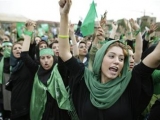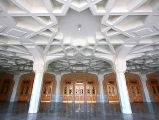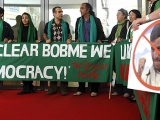Ni una sola imagen de los bombardeos de la aviación francesa sobre las ciudades de Gao, Konna y Kidal. ¿Cuántos muertos, heridos y desplazados? Silencio absoluto. La operación, diseñada por el Pentágono y ejecutada por Francia, con el pretexto de salvar a los malienses del integrismo islámico y combatir al terrorismo a las puertas de Europa, tiene lugar cuando la popularidad del presidente François Hollande cae en picado por la traición a su programa electoral.
“Misión civilizadora” contra los bárbaros es la cortina de humo para encubrir la estrategia de la OTAN de contener a China en África. Ahora es Mali, antes fueron Costa de Marfil, Sudán, Libia, y también están en la lista la República islámica de Mauritania y Argelia. En 2011, Sarkozy desplegó sus tropas en Costa de Marfil para colocar a su candidato Alassane Ouattara en la presidencia de este país, poseedor de petróleo, café y cacao, donde China ultimaba un acuerdo de inversión de 500 millones de dólares para la construcción de una central hidroeléctrica, con capacidad de exportar energía a los países vecinos.
En Sudán, EEUU rompió el país en dos (2011) y en la parte sur, empapada de oro negro y reconocida como el Estado número 193 de la ONU (mientras los palestinos y saharauis llevan décadas en la cola), se abrieron embajadas de EEUU y la UE (e Israel, que aumenta su presencia en Sudán, paliando los efectos de la pérdida de Egipto tras la caída de Mubarak), sobre inmensos campos petrolíferos y frente a minas de diamante y oro. Allí abortaron la oferta china de construir un megaoleoducto que pasaba por Kenia y terminaba en el Océano Indico. En Libia, la primera reserva de petróleo de África y la segunda de agua dulce del planeta, y donde unas 70 empresas chinas operaban, tras la toma del poder por los islamistas proOTAN, éstas han sido excluidas del mercado. Las sustituyen Alcatel-Lucent o Total.
Hilary Clinton criticaba en agosto de 2012 el hecho de que los africanos trabajaran con países que infringen los derechos humanos (o sea, China) y no con defensores de los valores democráticos (o sea su país). El principal objetivo de la OTAN es acabar con la contundente presencia china y su política basada en negocios que procuran beneficios mutuos, frente a la de EEUU y sus socios, que implantan bases militares, entrenan a soldados y pegan tiros.
En Mali
Vista la secuencia de los hechos, la cosa puede levantar la sospecha de ser una crisis planeada: 22 de marzo, golpe militar del oficial Amadou Sanogo, entrenado por los marines estadounidenses en Tejas, contra el presidente Amadou Touré, quien iba dejar el poder en las elecciones que debían celebrarse en abril; después llega la declaración de independencia del norte del país por los “laicos” tuareg y sus aliados islamistas (entre ellos los al qaedistas dirigidos por el argelino Mojtar Belmojtar, un ex muyahed que luchó en Afganistán, al servicio de EEUU contra el gobierno marxista de Nayibolah). El ejército aplaca la insurrección y pide ayuda a la ONU –ayuda que iba a ser política y de mediación, que no militar-para poner fin a una guerra tribal, abriendo el camino a la intervención extranjera.
Desde el inicio de 2012, el conflicto ya ha obligado a unas 200.000 personas a huir de sus hogares.
Malí, “el Sudán francés”, fue gobernado, tras su independencia de la metrópoli en 1960, por el socialista Modibo Keita, quien estrechó lazos con la Unión Soviética en materia comercial, cultural y militar. En 1968, el golpe de Estado organizado por Occidente que derroca a Keita, no impide el avance del “socialismo africano” en Angola, Etiopía y Mozambique, que se mueven en la zona de influencia soviética.
El fin de la URSS y la caída de aquellos gobiernos, deja el escenario libre a China y a los occidentales para ampliar su influencia en el continente. Con la privatización de los recursos naturales de Mali, las multinacionales europeas y las empresas chinas se hicieron con sus minas y su petróleo (ubicado justamente en la zona norte). El uranio maliense abastece el 38% de la necesidades de las 54 centrales nucleares francesas, mientras otro 50% se extrae de los países vecinos de Mali. Los contratos que unas 20 empresas chinas han firmado con este país, consisten en donaciones, préstamos sin intereses para construir viviendas y escuelas, inversión en industrialización, agroindustria, educación, salud y comunicación, así como en el desarrollo de una red ferroviaria.
En el vecino Níger, China ha roto el monopolio francés sobre el uranio de Azelik, y trabaja en la extracción de petróleo y la modernización de las instalaciones petrolíferas del país. En Chad, cerca de la capital, Yamena, y junto a la mayor base militar de Francia en África Central (desde donde ataca a Mali), China construye un oleoducto, una refinería, y un aeropuerto. La misma política en Camerún, Mauritania y Burkina Faso.
El regreso al colonialismo
La fragilidad de los regímenes afines a EEUU y Europa, en Asia y en África –por ser dictaduras corruptas, además de ser incapaces de garantizar un mínimo de bienestar a sus ciudadanos-, está propiciando la vuelta al colonialismo directo y con tropas en el terreno, asegurándose así un acceso duradero a los recursos naturales y las rutas comerciales. De ahí que EEUU y sus socios no vayan a salir de Irak, de Afganistán ni de Libia… por voluntad propia.
Que China – potencia sin bases militares fuera de su territorio- haya votado a favor de la intervención política de la ONU en Mali (que no el envío de tropas), muestra la importancia que tiene la estabilidad para su negocio de vender productos de consumo popular, y también garantizar la seguridad de sus ciudadanos. En 2012, medio centenar de trabajadores chinos fueron raptados en Egipto y Sudán.
A Pekín no le iría mal que los franceses aplastaran a los extremistas y bandidos, incluso si se quedaran atrapados en lo que va a ser un gigantesco pantano, mejor que mejor. ¿Piensa lo mismo la Alemania de Merkel, que se ha negado a echarle una mano a Hollande en ésta hazaña?
http://www.lamarea.com/2013/01/26/china-y-la-invasion-a-mali/
***
China and invasion of Mali
There isn’t any image Malini bombing of French aviation on the cities of Gao and Kidal Konna. How many dead, wounded and displaced? Absolute silence. The operation, designed by the Pentagon and by France, under the pretext of saving the Malian Islamic fundamentalism and fighting terrorism at the gates of Europe, takes place when the president’s popularity plummets François Hollande by the betrayal of his electoral program.
“Civilizing mission” against the Barbarians is a smokescreen to cover up NATO’s strategy to contain China in Africa. Now is Mali, Ivory Coast were before, Sudan, Libya, and are also listed the Islamic Republic of Mauritania and Algeria. In 2011, Sarkozy deployed his troops in Ivory Coast to place their candidate Alassane Ouattara as president of this country, holder of oil, coffee and cocoa, where China finalizing an investment agreement of $ 500 million for the construction of a hydroelectric plant, with capacity to export power to neighboring countries.
In Sudan, the U.S. broke the country into two (2011) and in the south, black and gold drenched the state recognized as number 193 of the UN (as Palestinians and Sahrawis have spent decades in the queue), U.S. embassies were opened and the EU (and Israel, increasing its presence in Sudan, alleviating the impact of the loss of Egypt after the fall of Mubarak), on vast oil fields and facing diamond and gold mines. They aborted the Chinese bid to build a megaoleoducto passing through Kenya and ended in the Indian Ocean. In Libya, the first African oil reserves and the second planet’s fresh water, and where some 70 Chinese companies operating after the seizure of power by the Islamists proOTAN, they have been foreclosed. The Alcatel-Lucent replaced or Total.
Hilary Clinton in August 2012 criticized the fact that Africans work with countries that violate human rights (ie, China) rather than defenders of democratic values (ie your country). The main objective of NATO is ending strong Chinese presence and policy-based businesses that seek mutual benefits, compared to the U.S. and its partners, who implement military bases, train soldiers and hit shots.
In Mali
Having the sequence of events, things can raise the suspicion of being a crisis planned: March 22, official military coup Amadou Sanogo, trained by U.S. Marines in Texas, against President Amadou Toure, who would leave power in elections to be held in April, after the declaration of independence comes from the north by the “secular” Tuareg and their Islamist allies (including the Qaedist led by Algerian Mokhtar Belmojtar, a former muyahed who fought in Afghanistan, U.S. service against the Marxist government of Nayibolah). The army insurrection relents and requests assistance from the UN-aid would be political and mediation military not to end a tribal war, paving the way for foreign intervention.
Since the beginning of 2012, the conflict has already forced about 200,000 people to flee their homes.
Mali, “French Sudan” was governed, after its independence from the metropolis in 1960, by the Socialist Modibo Keita, who strengthened ties with the Soviet Union in the commercial, cultural and military. In 1968, organized the coup that overthrew Western-Keita, does not prevent the spread of “African socialism” in Angola, Ethiopia and Mozambique, which move in the Soviet sphere of influence.
The end of the USSR and the collapse of those governments, free to leave the stage and western China to expand its influence in the continent. With the privatization of natural resources in Mali, European multinationals and Chinese companies took over the mines and oil (located just in the north). The Malian uranium supplies 38% of the needs of the 54 French nuclear plants, while another 50% is extracted from the neighboring countries of Mali. Contracts that about 20 Chinese companies have signed with this country, consisting grants, interest-free loans to build houses and schools, investment in industrialization, agribusiness, education, health and communication, as well as in the development of a rail network.
In neighboring Niger, China has broken the French monopoly on uranium Azelik, and works in the oil and the modernization of the country’s oil installations. In Chad, near the capital, N’Djamena, and next to the largest French military base in Central Africa (from where attacks Mali), China builds a pipeline, a refinery and an airport. The same policy in Cameroon, Mauritania and Burkina Faso.
The return to colonialism
The fragility of regimes allied to the U.S. and Europe, in Asia and Africa, for being corrupt dictatorships, besides being unable to guarantee a minimum of welfare to its citizens, is bringing back direct colonialism and with troops on the ground , ensuring sustainable access to natural resources and trade routes. Hence, the U.S. and its partners will not leave Iraq, Afghanistan or Libya … willingly.
That China – power without military bases outside its territory, has voted in favor of UN political intervention in Mali (not sending troops), shows the importance of stability for your business to sell consumer products popular , and also ensure the safety of its citizens. In 2012, fifty Chinese workers were kidnapped in Egypt and Sudan.
A Beijing not bad that the French would crush the extremists and bandits, even if they were trapped in what will be a giant swamp, all the better. Do you think the same thing Merkel’s Germany, which has refused to give a hand to Hollande in this feat?
http://www.lamarea.com/2013/01/26



